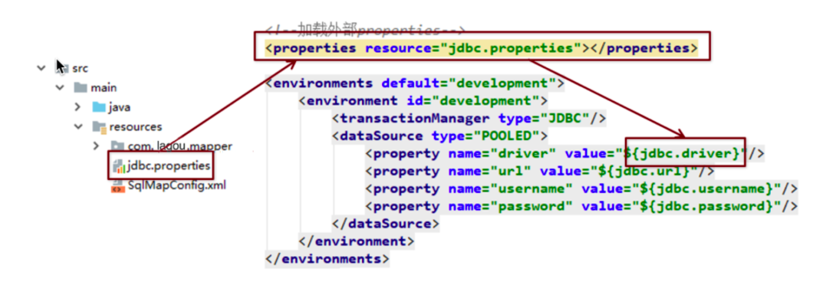配置文件深入
一、核心配置文件
1. 层级关系
- configuration
- properties 属性
- settings 设置
- typeAliases 类型别名
- typeHandlers 类型处理器
- objectFactory 对象工厂
- plugins 插件
- environments 环境
- environment 环境变量
- transactionManager 事务管理器
- dataSource 数据源
- environment 环境变量
- databaseIdProvider 数据库厂商标识
- mappers 映射器
2. 常用配置
environments

transactionManager 有两种
- JDBC:这个配置就是直接使用了JDBC 的提交和回滚设置,它依赖于从数据源得到的连接来管理事务作用域
- MANAGED:这个配置几乎没做什么。它从来不提交或回滚一个连接,而是让容器来管理事务的整个生命周期(比如 JEE 应用服务器的上下文)。默认情况下它会关闭连接,然而一些容器并不希望这样,因 此需要将 closeConnection 属性设置为 false 来阻止它默认的关闭行为
dataSource 有三种
- UNPOOLED:这个数据源的实现只是每次被请求时打开和关闭连
- POOLED:这种数据源的实现利用“池”的概念将 JDBC 连接对象组织起来
- JNDI:这个数据源的实现是为了能在如 EJB 或应用服务器这类容器中使用,容器可以集中或在外部配置数据源,然后放置一个 JNDI 上下文的引用
mapper
使用相对于类路径的资源引用,例如:
<mapper resource="org/mybatis/builder/AuthorMapper.xml"/>使用完全限定资源定位符(URL),例如:
<mapper url="file:///var/mappers/AuthorMapper.xml"/>使用映射器接口实现类的完全限定类名,例如:
<mapper class="org.mybatis.builder.AuthorMapper"/>将包内的映射器接口实现全部注册为映射器,例如:
<package name="org.mybatis.builder"/>Properties标签
实际开发中,习惯将数据源的配置信息单独抽取成一个properties文件,该标签可以加载额外配置的properties文件

typeAliase标签
类型别名是为Java 类型设置一个短的名字。原来的类型名称配置如下
<typeAliases> <typeAliase type="com.*.User" alias="user"></typeAliase> </typeAliases> <select id="findAll" resultType="user"> select * from user </select>Mybatis已经设置好一些常用类型别名
别名 类型 string String long Long int Integer double Double boolean Boolean … …
二、映射配置文件mapper.xml
1. 动态sql语句
Mybatis 的映射文件中,前面我们的 SQL 都是比较简单的,有些时候业务逻辑复杂时,我们的 SQL是动态变化的
条件判断
<select id="findByCondition" parameterType="user" resultType="user"> select * from User <where> <if test="id!=0"> and id=#{id} </if> <if test="username!=null"> and username=#{username} </if> </where> </select>for循环
<select id="findByIds" parameterType="list" resultType="user"> select * from User <where> <foreach collection="list" open="id in(" close=")" item="id" separator=","> #{id} </foreach> </where> </select> 其中: collection 代表要遍历的集合,不要写#{} open 代表语句的开始部分 close 代表语句的结束部分 item 代表遍历集合的每个元素,生成的变量名 sperator 代表分隔符sql片断抽取
<!--抽取sql片段简化编写--> <sql id="selectUser" select * from User</sql> <select id="findById" parameterType="int" resultType="user"> <include refid="selectUser"></include> where id=#{id} </select> <select id="findByIds" parameterType="list" resultType="user"> <include refid="selectUser"></include> <where> <foreach collection="array" open="id in(" close=")" item="id" separator=","> #{id} </foreach> </where> </select>